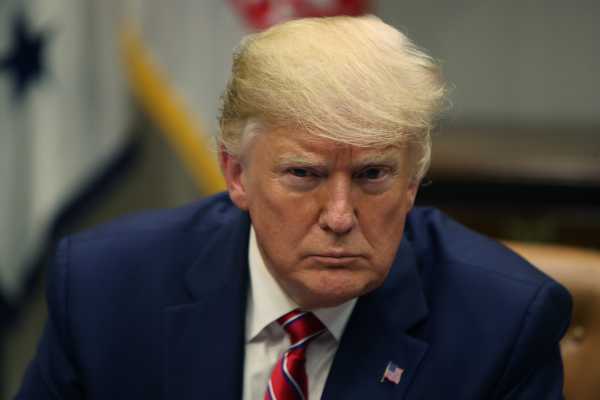
There are a lot of incredible things about President Donald Trump’s open admission that he would accept dirt on his political opponents in the 2020 election: namely, his comment in an ABC interview that “I’d want to hear” any information on a 2020 opponent on offer from foreign powers, and his suggestion that he wouldn’t call the FBI unless he thought “there was something wrong.”
I can’t imagine why Trump would think it’s a good idea to admit that he’s interested in election collusion under any circumstances, let alone when Democrats are considering bringing impeachment charges based on the Mueller report. Perhaps the president is just so brazen that he thinks he can get away with admitting the worst about himself and his approach to politics openly.
But this admission has another, more subtle effect: It exposes Trump’s vaunted “America First” nationalism, which so many “intellectual” defenses of Trump have valorized, for the sham that it is.
A principled nationalist would see foreign efforts to interfere in a US election as an unacceptable infringement on American sovereignty and independence. But Trump’s nationalism isn’t principled. It doesn’t value American independence and self-determination all that much. It is an exclusive nationalism centering on hating foreigners and difference, xenophobia by another name.
Trump’s sham nationalism
High-minded defenses of Trump and his peers among the European far right often point out that nationalism has been often been a tool of national liberation. In 19th-century Europe, nationalist movements in Italy and other places challenged empires and contributed to the spread of democracy on the continent. After World War II, nationalist movements in Asia and Africa helped throw off the yoke of European colonialism and allow formerly marginalized people to govern themselves.
The conclusion we’re supposed to draw from this history is that Trump and other far-right politicians aren’t unthinking xenophobes; they’re part of a venerable political tradition with real value, even today. It’s a perspective that sees nationalism as a check on imperialism and democratically imperfect international organizations like the European Union.
I should say I’m not a nationalist in any sense of the world. I’m an avowed globalist, someone who believes deeply that borders between nations and barriers between people contribute to war, poverty, and the persistence of bigotry. But there are thoughtful versions of nationalism, worldviews I can respect even if I disagree with them. Read Oxford political theorist David Miller’s book On Nationality if you’re looking for an example.
The problem, though, is that Trumpian nationalism has none of these virtues.
Some historical nationalists were admirable in large part because they worked to end foreign interference in their domestic affairs. Trump actively welcomes such interference if it helps his political fortunes — as he admitted Wednesday. European far-right politicians take a similar view: A number of them have benefitted from Russian support, including direct funding from Russian banks.
Any nationalism worth its salt would see Russia’s interference in the 2016 election, which involved the illegal hacking of a major American party and attempts to misinform the American electorate through social media, as an unacceptable form of interference with American sovereignty. Trump not only doesn’t care, but is all but openly calling on Putin to do it again. Labeling him the heir of nationalist heroes like Italy’s Giuseppe Garibaldi and Ghana’s Kwame Nkrumah is laughable.
When Trump says “nationalism,” what he really means is ethnonationalism: A politics in which a certain kind of person, white native-born Americans, deserve privileged access to political power and favor.
His ethnonationalism is about marginalizing immigrants, making them afraid and miserable, while telling non-immigrant minorities that they don’t quite belong in Trump’s America. His deep hostility to international trade and skepticism about America’s traditional alliances do not add up to a cogent nationalist political doctrine, nor do they not erase the true heart of Trump’s nationalism: the border wall, the Muslim ban, and family separation.
So while there may be defensible nationalisms out there, it’s painfully clear that Trump’s isn’t one of them.
Sourse: vox.com






